Top Executive Interviews "SOU"
- Code:7699
- Sector:Wholesale Trade
- Listing Date:Jun. 29, 2021
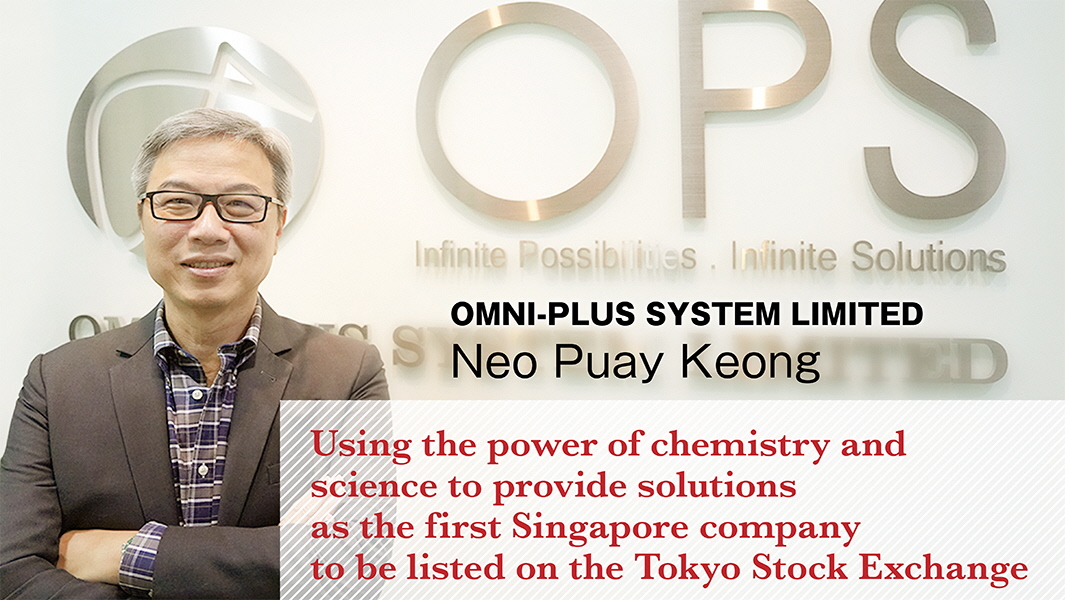
A boy born in the year of Singapore's independence uses his knowledge of chemistry to build a multinational corporation
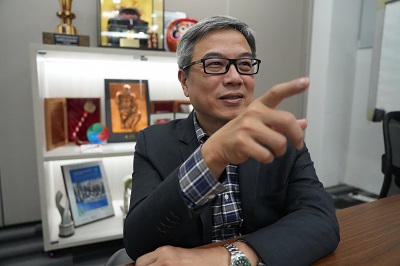
Omni-Plus System Limited is the first ever Singaporean company to be listed on the Tokyo Stock Exchange. As a materials technology company, its core competencies are in the areas of engineering plastics logistics and distribution, and plastic resin development and manufacture. The company's name comes from its dedication to providing systems that will function positively in solving its customers' problems in a wide variety of areas. Indeed, the omnipresence of plastics as a material in our modern society makes this ambition understandable. But CEO Neo Puay Keong explains that Omni-Plus System is first and foremost a solutions company.
"We have no desire to promote ourselves as a plastics company or a chemicals company. Rather, we provide solutions using chemistry and science to overcome any problem. That's why we use the infinity symbol in our company logo, while the use of the color green is to underscore our commitment to sustainability. When I first started the company, and I thought about how we would go about trying to grow into an international corporation, I wanted to make sure we did it in a sustainable way."
Neo Puay Keong was born in 1965, the year Singapore achieved independence. Throughout his childhood, he watched as his parents rebuilt their store, which had been reduced to a streetside stall by the chaos of the independence movement and the effects of the civil unrest in Indonesia in the same year, and developed it into a thriving business. Well aware of the importance of education, his parents sent him to a traditional Catholic school, where he learned the virtues of discipline and integrity. After graduating from high school, where the subject of chemistry came so easily to him that he barely needed to study at all, he proceeded to Singapore Polytechnic, where the direction of his life was ultimately decided.
"I specialized in the study of polymers at Polytechnic, and I was fortunate enough to earn an interview with Nagase Co., Ltd. There weren't many students specializing in polymers at that time, and Nagase was looking to expand its presence in Singapore and Southeast Asia. I took a job with them, where I provided not only my expertise in the latest technology, but also regional technical support. I spent some time training in Japan, to learn about the specific characteristics of each product. I was essentially hired to sell Nagase's technological expertise, but this also involved a lot of practical technical support on my part. Nagase only had a very small team in Singapore at the time, which meant that not only was I involved in dealing with the materials themselves, but I was also a key part of the company's marketing and sales activities."
Tasked with performing this wide range of duties at Nagase, Keong was eventually headhunted by Elf Atochem.
"As Singapore was one of the few countries in Southeast Asia with its own polymerization plants, Elf Atochem, a French company, had selected it as the location for its first plant outside of Europe. As part of this pioneering project, I helped grow its market share from zero to 5000 metric tons per month, and learned about factory manufacturing processes and Southeast Asian supply chains and logistics along the way. It was a wonderful experience for me. At the time, the major markets were monopolized by Japanese and American companies, which meant that Elf Atochem needed to come up with revolutionary ideas to prove its worth. To that end, we worked in tandem with universities to develop simulation software, and strove to shorten the time frames for the introduction of new molds and products into the market. We even developed mini-computers to run the simulation software. While our efforts bore no fruit at all to begin with, we knew that we wanted to make use of cutting-edge technology to drive the market forward."
Sensing demand for providing solutions to clients' problems, Keong is inspired by the Y2K bug to start his own company
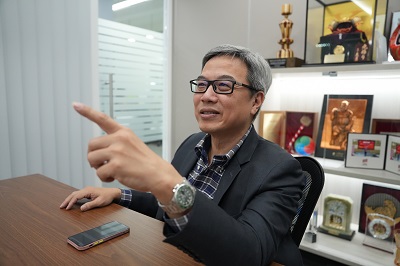
Developing rapidly as a hub for multinational corporations to find a foothold in the Asian market, Singapore was the locus for increasing business activities by European, American, and Japanesecompanies. Keong learned a great deal from his dealings with these multinationals. But what was the catalyst that inspired him to leave a successful company and strike out on his own?
"When I visited our American and European clients, we would often discuss the problems they had, and how these could be addressed in terms of the development of new materials or new solutions. But as a major multinational corporation itself, Elf Atochem was unable to move quickly to address these concerns. It would take many years from receiving an official request before the company would be able to develop new materials. I came to understand that there was a vast gulf between what the industry was providing and what our customers really needed, and I realized that I might be able to do what it was that our clients wanted. At the time, startups were relatively rare; there were very few who were prepared to launch a new business from scratch. But I had a philosophy that differed from those of the multinationals, and I saw the provision of business solutions as the niche in the market which I could fill."
Having spotted this opportunity to start something new, Keong then came face to face with the so-called Y2K bug, in which problems with the handling of dates in computer programs led to concerns of major malfunctions as the year changed from 1999 to 2000.
"I had already had the idea of starting a business that would bridge the gap between client needs and what the industry was providing, but I saw Y2K as another such opportunity to provide solutions to client needs. The simple failure on behalf of programmers to anticipate the problems wrought by the change in date at the end of the millennium had created this huge global issue, and led companies around the world to change their hardware and software. Seeing this, I knew that it was the provision of similar solutions to practical problems which I would be able to provide."
Growth amid the hardships of pandemics and global financial recessions
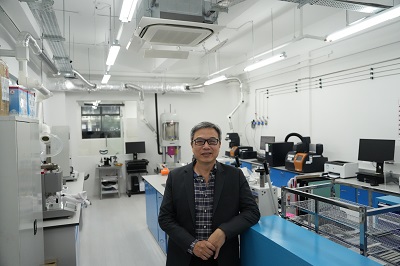
As a man of action, it did not take long before Keong launched Omni-Plus System Limited in 2002. By developing a well thought-out business model, he was able to secure a number of clients from the very beginning. The first challenge was raising capital to launch the company; he did this by explaining the project to close friends and asking for their help. He then hired just one other worker to handle administrative duties, and began this ambitious undertaking from just a single desk in a small office. Despite these austere beginnings, Keong recalls with a smile the sense of satisfaction he would derive from providing solutions to meet his clients' needs, and remembers how his clients would invariably leave satisfied and grateful. Since that time, the company has managed to overcome a number of major global hurdles, from the bursting of the dot-com bubble to the international financial crisis of 2007-08, to the SARS outbreak.
"Throughout all of the crises we have faced, we have been helped by the loyalty shown to us by our clients and our suppliers. The Singaporean government, also, has always provided professional business support, which has allowed us to work together with the authorities to overcome each challenge. This includes the recent COVID-19 pandemic, of course, but it goes all the way back to the SARS outbreak as well. These crises have always made financing very difficult, but they have also had positive effects. Our employees have invariably given everything they could to help support us in our time of need. For a long time after the company's establishment, we were unable to raise salaries, but they still worked diligently and uncomplainingly."
A decision is made to list on TSE Mothers, rather than in London or New York
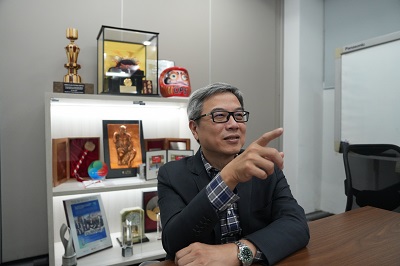
It was during the COVID-19 pandemic, on the 29th of June, 2021, that Omni-Plus System finally became a listed company. When deciding where to list, Keong quickly discounted London, as its strengths in the field of finance did not provide a good match for a tech development corporation. Being based in Asia, New York also seemed inconvenient. Finally, he settled on the Tokyo Stock Exchange as a trusted, Asian-based exchange highly valued for its transparent governance.
"As a giant of the technology and chemical sectors, Japan has traditionally led Asia in terms of chemical plant development, and is home to significant know-how concerning the market. We felt that listing on the TSE would allow us to demonstrate to our potential future client base that our company, too, features superior governance and transparency. As a company that places great focus on technological development, we wanted to ensure we had efficient access to a global marketplace. After all, we know that foreign clients are always keen to support innovative technology and novel solutions."
Keong is grateful for the cooperation his company has received from financial institutions and his legal representatives throughout the listing process. He is also aware that this achievement was only made possible as a result of coordinated assistance not only from the TSE, but also from a range of Singaporean governmental agencies including ESG (Enterprise Singapore), A*STAR (the Singapore Agency for Science, Technology and Research), and MAS ( the Monetary Authority of Singapore).
"Due to the border restrictions put in place as a result of the pandemic, we had to receive entry permission from the Malaysian government as well, and ESG coordinated that for us. We have been blessed to receive such support from so many governmental institutions. Perhaps the biggest hurdle for an overseas-based company like us wishing to be listed on the Tokyo Stock Exchange is the language barrier. Naturally, there were a number of forms that needed to be filled out in Japanese, but our partners such as Mizuho Securities helped us a great deal in that regard. We were lucky to have such support to work around the language issue."
Increased trust earned by listing, and the future of the company
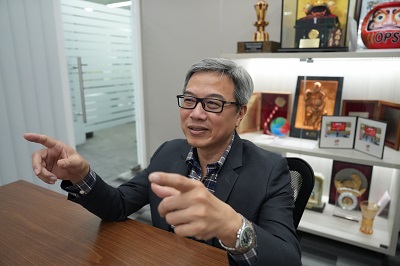
Keong claims that they have already benefited significantly from the company's listing. In addition to the obvious financing advantages, he says the listing has had other positive effects.
"By listing on the Tokyo Stock Exchange, we have been able to demonstrate to our stakeholders and business partners that we have sound governance and transparent business processes in place. This has made international business dealings much easier. Listing on the TSE has been a real breakthrough for us. It has allowed us to show how we operate at every step of the process, and has made it easier, for example, to negotiate with banks and other financial institutions. Our ties with Japanese corporations and our Japanese business partners have been strengthened, while our market penetration and customer awareness has also been improved, leading to the expansion of our potential client base. Before listing, if we wanted to work together with a Japanese startup on a new project, for example, we would have been forced to spend several years demonstrating what kind of company we are to our potential partners, and proving that we can be relied upon. Now that we are a listed company, however, it has become much easier for our partners to understand who we are."
The company has also been able to provide larger bonuses for its employees. More importantly, though, it has been able to show its employees that the company is being operated based on transparent HR policies. Keong sees the recruitment of high-quality staff as every bit as vital as securing new business partners.
"Our employees have developed a stronger sense of company loyalty and belonging. These days, no company wants to see a dynamic where employers are pitted against employees. Employees now want to work for companies that will do right by them. They are trying to forge their own career path, and no longer see a company as merely the source of their salary. They are looking for corporate strategy and a vision for the future. Since listing on the TSE, it has become significantly easier for us to secure quality human resources, while the commitment of our employees to the company has increased. Although we are aware that in the long run, we may be providing education and training to future rivals to the company, we feel it is our social responsibility to raise the quality of our employees and of the industry as a whole."
For both shareholders and employees, the company prioritizes transparency and trust above all else. With the firm ambition to grow further and become a world leader in the industry, the company continues to work closely with ESG and A*STAR to attract new talent to the field.
"For us, recruitment is inextricably tied to our corporate strategy. Stakeholders in our company are not restricted merely to our shareholders, but also include our employees, our clients, our partners, and even the financial institutions we work with. While we strive to be transparent about everything we do, as our business deals with cutting-edge technology, NDAs cover a lot of our dealings. With confidentiality of the utmost importance, we need workers with the qualities of honesty and integrity. Trust between the company and its employees, and relationships between the company and its clients are not things that can be built overnight. In order to ask for confidentiality and the protection of intellectual property rights, we know that we first have to build strong relationships with our clients."
With 95 percent of the company's revenue derived from overseas, and 70 percent of its client base made up of multinational corporations, the company possesses the DNA shared by many Singaporean companies that makes them naturally equipped to do business overseas. There is a plan currently in progress to digitize the operation of its regional plants under the auspices of the company's Singaporean headquarters as a kind of control tower. Once this is in place, geographical restrictions will be rendered still more meaningless. The location of an engineering center in the hub of Asia that is Singapore also allows access to virtually any location on the planet.
"I want our clients to be totally satisfied with the results we provide for them. When they are, they will contribute themselves to our future successes. That's why I see passion as so important. As Asians, we value honor and commitment, and we know that this must be shown in our actions as well as our words. When everyone approaches their tasks with commitment, passion, and responsibility, that is what will move the company forward. But even more important than that is the ability to challenge convention and the status quo. When a company can no longer rise to the challenges it faces, then it is finished. That is why we have always striven to ensure that this company moves forward to find the solutions we need."
Three simple words of advice: "Just do it!"
Company management is more like a marathon than a sprint. While he has continued to attempt to expand the capacity of the industry over a long period of time, such as through the development of biopolymers as an ESG initiative which he has worked on for over 15 years, Keong is always mindful of the need to look after his own health in order to sustainably maintain his own management quality. As he sees it, indulging in his hobbies of gardening and tea ceremony are effective methods of slowing down his mind and body to facilitate the transition from the high-speed world of technology to the slower speeds of everyday life. When asked what he would tell other Singapore-based entrepreneurs looking to list their businesses on the Tokyo Stock Exchange, he has three simple words of advice: "Just do it."
"I would advise anyone to take up the challenge. Through my own experience, I have learned that the TSE is an institution that can be relied upon wholly. Everyone involved has treated me with respect and compassion, and I'm sure the same could be said for any Singapore-based company, or any company from another country, for that matter. My advice would be that there's no time like the present. Just do it."
Profile
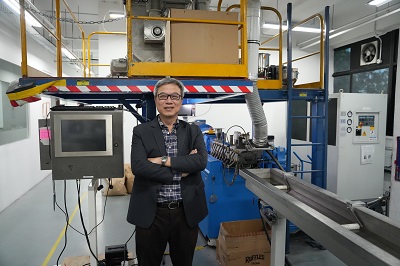
Chief Executive Officer(CEO)
- (Academic Background)
- 1985
- Graduated from Singapore Polytechnic Department of Chemical Process Engineering
- 1988
- Acquired Advanced Diploma in Plastics Technology Singapore Polytechnic, Department of Chemical Process Engineering
- 1995
- Graduated from Singapore Institute of Management
- 2014
- Graduated from Nanyang Technological University MBA
- (Career History)
- 1988
- Joined Nagase Singapore Pte Ltd
- 1992
- Joined Elf Atochem SEA Pte Ltd (Currently Total Petrochemicals (S.E.A.) Pte Ltd)
- 2002
- Establishment of Omni-Plus System Limited Assumed the position of CEO, Chairman (Current Position)
Company

- Code:7699
- Sector:Wholesale Trade
- Listing Date:Jun. 29, 2021



